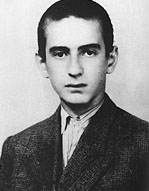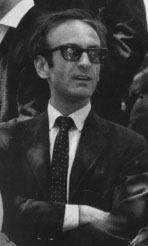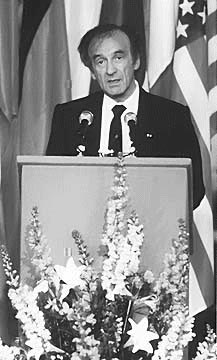

Elie Wiesel was born on September 30, 1928 in the small town of Sighet in Transylvannia, Romania. Elie was born into a family of four, he had two older sisters and a few years after his birth, his younger sister Tzipora was born. Elie's hometown of Sighet was many a times claimed by both Hungary and Romania and, in the 20th century changed power.
While growing up as
a young boy Elie found sanctuary in his religious studies. He loved to
study in classical Hebrew, Jewish Mysticism, and the Hassidic Sect of
Judaism to which his mother's
family belonged. He would love to sit and spend ours studying and practicing
Jewish traditions.
Although Elie and his family spoke Yiddish at home they acquired other languages ; such as Ukrainian, Romanian, German, Russian, and other languages to fit the needs of his fathers (Shlomo) grocery store.
During the first part of World War II the small town of Sighet stayed virtually untouched. The Wiesels hoped that their small town would be safe from the horror and injustice of the injurious Nazi death camps. They were living on belief that they would not be deported to concentration camps and also that they would not be parted as a family. Their dreams were shattered when the Nazi troops unexpectedly arrived in Sighet in 1944. When Elie was only fifteen years old, he and his family were deported the infamous Nazi death camp named Auschwitz. On arrival the fear of death began to set in when the saw the roaring flames of the dead bodies that were being burned in the crematories. When the Wiesels were hurried off the cattle cars they were immediately separated . Tzipora and Elie's mother were among the first on that day to be sent to die at the hands of the pernicious crematories. That would be the last time that Elie would ever see his mother and sister ever again.
After the men and women were divided, the men were forced to go through a rigorous selection. Elie and his father managed to survive the selection . Later on, they were forced to run to a place called Buna where they were assigned to barracks. When they arrived, Elie was stripped of his name, from that day on he was known only by the number A-277, which had been tattooed on him for the rest of his life as a reminder of the Holocaust.
For one year Elie
and his father protected each other. In the camps there were several sad
days when Elie would see things like a son killing his father for a piece
of bread, and Elie hoped that such a thing as this would never happen
to him and his father. Elie began to lose faith in his once glorious God.
He began to hate and resent life but he did not completely  lose
his faith. He still had hope that God was doing this for a reason.
lose
his faith. He still had hope that God was doing this for a reason.
During the whole horrific experience of the Holocaust, Elie and his father were forced to endure inhumane conditions. They were forced to work endless days, and they would be put under starvation. They suffered from exhaustion and exposure to disease.
Elie's father finally succumbed to starvation, dysentery, exhaustion and exposure. Shlomo died in his barracks, and at night the SS officers came and took him to the crematorium. The last word that Elie's father ever uttered, while on his deathbed, was "Eliezer", as Elie reported in Night. Although this horrifying memory would haunt him for the rest of his life, his will to survive was so low that he could not even cry. His tears and his heart became dry like a desert. He said that if he could somehow express in words what he felt at that moment, he might have found something like "Free at last!". A few weeks after his father agonizing death Elie was liberated from Germany.
After the war Elie was still a teenager and since his parents were murdered in the concentration camps he spent time in a French orphanage for a short amount of time. When in France he found out that his two older sisters survived the war and were still alive. As a young man Elie went to the Sorbonne. He cared for himself by becoming a choir master and a teacher of Hebrew. He soon found that his real passion was writing. He became a professional journalist writing for French and Israeli newspapers.
Elie Wiesel was so traumatized and completely devastated by the experience of the Holocaust that it was too painful for him to speak of his experiences. He took a ten year vow of silence on never speaking about the Holocaust, but during an interview with François Mauriac he decide to break his vow of silence and write about the Holocaust to inform people about the actual events and injustices that took place. He wrote a 900-page work in Yiddish entitled Un die welt hot geshivgn (And the World Kept Silent). This was the first of over 30 books that he was eventually to write. He then shortened the work to a 127- page work and he called it La Nuit (Night). He then wrote other autobiographical books that would soon be a part of the Night Trilogy ( Le Juor- Accident, L'Aube- Dawn ).
In 1956 Elie Wiesel
successfully applied for an American citizenship. He soon married his
wife Marion, and he had a son by the name
of Elisha. Elie Wiesel and his wife Marion Wiesel founded the Elie Wiesel Foundation for Humanity soon after he was
awarded the 1986 Nobel Prize for peace. The Foundation's mission, rooted
in the memory of the Holocaust, is to advance the cause of human rights
by creating forums for the discussion and resolution of urgent ethical
issues.
Wiesel founded the Elie Wiesel Foundation for Humanity soon after he was
awarded the 1986 Nobel Prize for peace. The Foundation's mission, rooted
in the memory of the Holocaust, is to advance the cause of human rights
by creating forums for the discussion and resolution of urgent ethical
issues.
In 1978 he was appointed chairman of the Presidential Commission on the Holocaust, which was later renamed the United States Holocaust Memorial Council. Soon he was awarded the Congressional Gold Medal of Honor and a year later, the Nobel Peace prize. He then decided to dedicate his life to informing people about the tragedy of the Holocaust so that it never happens again. He became the founder of the Elie Wiesel Foundation to inform kids about the Holocaust. He teaches at Boston University as the Andrew W. Mellon Professor in the Humanities. He now resides with his wife Marion and his son Elisha in New York.
Despite all of the atrocities that Elie lived through, he selflessly opened to the public a memoir of his experiences. He did not do this to achieve fame or wealth. His main goal was to show to people how human imperfections and the inability to reason led to such an enormous calamity as the Holocaust.





